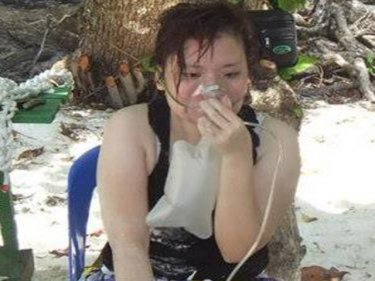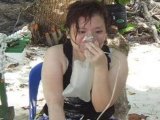PHUKET: All speedboat tour agents on Phuket are being urged to instruct day-trippers in how to use snorkels after a Malaysian tourist almost drowned this week.
The woman, on an outing to the Similan islands, needed cpr and oxgen after taking in water because she was not told how to use the snorkel properly.
The incident is one of several on outings from Phuket that have resulted in drownings or near-drownings this year.
Mana Permpoon, Director of the Search and Rescue Unit at the Similan Islands National Park, said today that his team would begin instructing tourists immediately as a result of the Malaysian tourist's near-tragedy.
''More people are coming to Phuket from Russia, China, Korea and other Asian countries,'' he said today.
''The basics of staying afloat and using a snorkel are not clearly understood by many of these tourists.
''It was different in the days when tourists from Europe and Australia made up most of Phuket's visitors. Mostly, these peole have been trained to swim and know how to use snorkels.''
It's standard procedure for speedboat staff simply to hand out snorkels, masks and fins from a basket without giving any instruction in how they should be used safely.
While the mechanics of the process are simple, lack of instruction appears to be leading to more deaths and near-deaths among people from non-swimming countries.
A non-swimmer can stay afloat and snorkel while using a flotation jacket. But the rash of incidents has led Khun Mana to decide a more thorough, safe approach is now necessary.
''We will start giving courses to all people staying on the Similan islands within two weeks,'' he said.
''My advice would be that all staff connected with speedboat trips should urgently think about doing the same.''
The number of Chinese and Russians visiting Phuket has increased dramatically. Often they are from regions where there are no beaches.
A high proportion of people from those countries especially figure in drownings and rescues.
The Similans, perhaps the best snorkelling and diving spot close to Phuket and Phang Nga, has a search and rescue team of 15. The park closes between April and November each year to regenerate.
The woman, on an outing to the Similan islands, needed cpr and oxgen after taking in water because she was not told how to use the snorkel properly.
The incident is one of several on outings from Phuket that have resulted in drownings or near-drownings this year.
Mana Permpoon, Director of the Search and Rescue Unit at the Similan Islands National Park, said today that his team would begin instructing tourists immediately as a result of the Malaysian tourist's near-tragedy.
''More people are coming to Phuket from Russia, China, Korea and other Asian countries,'' he said today.
''The basics of staying afloat and using a snorkel are not clearly understood by many of these tourists.
''It was different in the days when tourists from Europe and Australia made up most of Phuket's visitors. Mostly, these peole have been trained to swim and know how to use snorkels.''
It's standard procedure for speedboat staff simply to hand out snorkels, masks and fins from a basket without giving any instruction in how they should be used safely.
While the mechanics of the process are simple, lack of instruction appears to be leading to more deaths and near-deaths among people from non-swimming countries.
A non-swimmer can stay afloat and snorkel while using a flotation jacket. But the rash of incidents has led Khun Mana to decide a more thorough, safe approach is now necessary.
''We will start giving courses to all people staying on the Similan islands within two weeks,'' he said.
''My advice would be that all staff connected with speedboat trips should urgently think about doing the same.''
The number of Chinese and Russians visiting Phuket has increased dramatically. Often they are from regions where there are no beaches.
A high proportion of people from those countries especially figure in drownings and rescues.
The Similans, perhaps the best snorkelling and diving spot close to Phuket and Phang Nga, has a search and rescue team of 15. The park closes between April and November each year to regenerate.




















Sounds like a rule the Marine Office 5 should and could implement and enforce.
Posted by Andrew on November 14, 2012 20:15